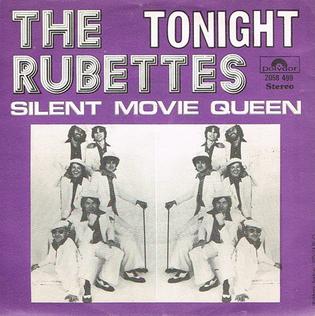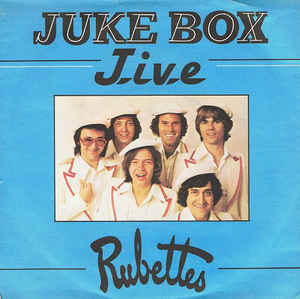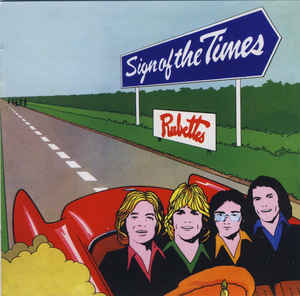
The Rubettes are an English pop/glam rock band put together in 1974 after the release of "Sugar Baby Love", a recording assembled of studio session musicians in 1973 by the songwriting team of Wayne Bickerton, the then head of A&R at Polydor Records, and his co-songwriter, Tony Waddington, after their doo-wop and 1950s American pop-influenced songs had been rejected by a number of existing acts. Waddington paired the group with manager John Morris, the husband of singer Clodagh Rodgers and under his guidance, the band duly emerged at the tail end of the glam rock movement, wearing trademark white suits and cloth caps on stage. Their first release, "Sugar Baby Love" was an instant hit remaining at number one in the United Kingdom for four weeks in May 1974, while reaching number 37 on the US chart that August, and remains their best-known record. Subsequent releases were to be less successful, but the band continued to tour well into the 2000s with two line-ups in existence.

How I Learned to Love the Bootboys is the fourth and final album by British rock band the Auteurs. It was released on 5 July 1999 through Hut and Virgin Records. Following their third studio album After Murder Park (1996), Haines started the Baader Meinhof and Black Box Recorder projects. He regrouped with the Auteurs to start work on a concept album under the name ESP Kids, though sessions halted as Black Box Recorder worked on their debut album England Made Me (1998). The Auteurs re-started recording their next album in January 1998 at RAK Studios in London; Hut and Virgin were not happy with the lack of single-sounding songs. After writing "The Rubettes", the band finished recording in April 1998. How I Learned to Love the Bootboys is a glam rock album that takes atmospheric influence from England Made Me.

"Sugar Baby Love", recorded in autumn 1973 and released in January 1974, is a bubblegum pop song, and the debut single of The Rubettes. Written by Wayne Bickerton and Tony Waddington and produced by Bickerton, engineered by John Mackswith at Lansdowne Recording Studios, and with lead vocals by Paul Da Vinci, "Sugar Baby Love" was the band's one and only number one single in the UK Singles Chart, spending four weeks at the top of the chart in May 1974.

We're the Brotherhood of Man is the second album by British pop group The Brotherhood of Man in their early incarnation on Deram Records. It was released in April 1972 and featured the US hit "Reach Out Your Hand".
Paul Da Vinci is a British singer and musician. He is best known as the lead singer on the 1974 hit recording by the Rubettes, "Sugar Baby Love", although he did not perform with the group at the time. He worked as a demo and session singer before and after his own successful solo career, which included the UK hit "Your Baby Ain't Your Baby Anymore", which peaked at number 20 in the UK Official Charts, week ending 17 August 1974 and number 54 in Australia. In the 80s, Paul sang most of the voices backing and lead on the Tight Fit hit "Back to the Sixties, Part 2", and performed on Top of the Pops with the group.
Wayne Bickerton was a British record producer, songwriter and music business executive. He became well known, with Tony Waddington, as writer and producer of a series of UK chart hits in the 1970s for The Rubettes, and as a leading figure in SESAC – one of the three major American performing rights organisations.

Run the Length of Your Wildness is the first album by Kathe Green. It was originally released by Deram Records, a sister label to Decca Records.

State Records is a British independent record label, established by Wayne Bickerton, Tony Waddington and John Fruin in 1975. The label released hits by many successful artists including the Rubettes, Mac & Katie Kissoon and Delegation.
Anthony Brandon Joseph Waddington is an English singer-songwriter, record producer, film producer, screenplay writer, and creative media executive. He became well known with Wayne Bickerton, as writer and producer of a series of UK chart hits in the 1970s for The Rubettes. He also received an Ivor Novello Award as "Songwriter of the Year".

We Can Do It is the second studio album by the English pop band The Rubettes, released on the State Records label in March 1975. The album reached no 41 in the UK charts and contained two UK top 10 hits – "I Can Do It" and "Juke Box Jive".

Wear It's 'At is the debut album by English pop band The Rubettes assembled in 1973 by the songwriting team of Wayne Bickerton, then the head of A&R at Polydor Records, and his co-songwriter, Tony Waddington, after their doo-wop and 1950s American pop-influenced songs had been rejected by a number of existing acts. Tracks from this album also exhibited the doo-wop style. The album title was a reference to the group's wearing trademark white suits and white cloth caps on stage, a white cap being shown on the album front cover.

"Tonight" was the second single released by The Rubettes from their debut album Wear It's 'At. Written by Wayne Bickerton and Tony Waddington and produced by Bickerton, the single reached number 12 in the UK charts.

"Juke Box Jive", by English band The Rubettes, was the lead single from their second album We Can Do It. As with their two previous singles, it was written by the songwriting team of Wayne Bickerton and Tony Waddington and produced by Bickerton. The single reached number 3 in the UK charts.

"I Can Do It" was the fourth single released by the English band The Rubettes and the second single from their album We can do it. The song was written and produced by Wayne Bickerton and Tony Waddington. It reached number 7 in the UK charts, making it the band's third top 10 UK hit from four single releases.
The single was significant in that it was the first release on the State Records, a label set up by Bickerton, Waddington and John Fruin in 1975, bearing the catalogue number STAT 1.

Sign of the Times is the fourth studio album by the English band The Rubettes. It was released on the State Records label in June 1976. The album represented a significant change in direction for the band, as it was the first not produced by Wayne Bickerton and Tony Waddington – instead the Rubettes took on production responsibilities themselves, with Alan Blakley as co-producer. The band made the decision due to the disappointing sales of their previous two Bickerton/Waddington singles and the desire to forge new musical directions.

Still Unwinding is the seventh studio album by the English band The Rubettes. It was released on the Polydor label in October 1978, just seven months after their previous studio album Sometime In Oldchurch. It was the last album the band released in the 1970s - their next album Shangri'la, despite being recorded in 1979, was not released until 1992.

Baby I Know is the fifth studio album by the English band The Rubettes. It was released on the State Records label in April 1977.

Sometime In Oldchurch is the sixth studio album by the English band The Rubettes. It was released on the Polydor Records label in March 1978.

Shangri'la is a studio album by the English band The Rubettes. It was recorded in 1979, however was not released in its entirety until 1992, as part of the Rubettes "Albums 7 & 8" double CD set. Three of the album's tracks featured on single releases in 1979, with the other seven tracks remaining unreleased until 1992. It is regarded as the band's eighth studio album, despite being released after "Riding On A Rainbow".

Riding on a Rainbow is a studio album by the English band The Rubettes. It is the band's ninth studio album, despite being released approximately six months before the eighth album Shangri'La.

















